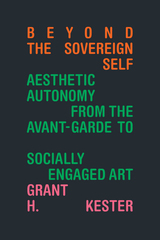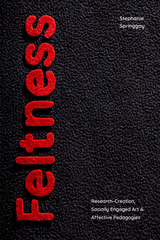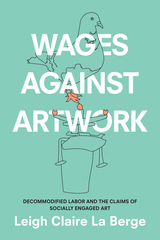3 books about Socially Engaged Art

Beyond the Sovereign Self
Aesthetic Autonomy from the Avant-Garde to Socially Engaged Art
Grant H. Kester
Duke University Press, 2024
In Beyond the Sovereign Self Grant H. Kester continues the critique of aesthetic autonomy begun in The Sovereign Self, showing how socially engaged art provides an alternative aesthetic with greater possibilities for critical practice. Instead of grounding art in its distance from the social, Kester shows how socially engaged art, developed in conjunction with forms of social or political resistance, encourages the creative capacity required for collective political transformation. Among others, Kester analyzes the work of conceptual artist Adrian Piper, experimental practices associated with the escrache tradition in Argentina, and indigenous Canadian artists such as Nadia Myre and Michèle Taïna Audette, showing how socially engaged art catalyzes forms of resistance that operate beyond the institutional art world. From the Americas and Europe to Iran and South Africa, Kester presents a historical genealogy of recent engaged art practices rooted in a deep history of cultural production, beginning with nineteenth-century political struggles and continuing into contemporary anticolonial resistance and other social movements.
[more]

Feltness
Research-Creation, Socially Engaged Art, and Affective Pedagogies
Stephanie Springgay
Duke University Press, 2022
Stephanie Springgay’s concept of feltness—which emerges from affect theory, queer and feminist theory, and feminist conceptions of more-than-human entanglements—is a set of intimate practices of creating art based on touch, affect, relationality, love, and responsibility. In this book, she explores how feltness is a radical pedagogy that can be practiced with diverse publics, including children, who are often left out of conversations about who can learn in radical ways. Springgay examines the results of a decade-long project in which researchers, artists, students, and teachers participated in events in North American elementary, secondary, and postsecondary institutions. In projects that ranged from children learning to be critics and artists to university students experimenting with building “a public” through art, participants blended participatory art creation with academic research to address social justice issues. Springgay shows how feltness can redefine who is imagined to be capable of complex feeling, experiential learning, embodied practice, social engagement, and intimate care. In this way, feltness fosters learning that disrupts and defamiliarizes schools and institutions, knowledge systems, values, and the legibility of art and research.
[more]

Wages Against Artwork
Decommodified Labor and the Claims of Socially Engaged Art
Leigh Claire La Berge
Duke University Press, 2019
The last twenty years have seen a rise in the production, circulation, and criticism of new forms of socially engaged art aimed at achieving social justice and economic equality. In Wages Against Artwork Leigh Claire La Berge shows how socially engaged art responds to and critiques what she calls decommodified labor—the slow diminishment of wages alongside an increase in the demands of work. Outlining the ways in which socially engaged artists relate to work, labor, and wages, La Berge examines how artists and organizers create institutions to address their own and others' financial precarity; why the increasing role of animals and children in contemporary art points to the turn away from paid labor; and how the expansion of MFA programs and student debt helps create the conditions for decommodified labor. In showing how socially engaged art operates within and against the need to be paid for work, La Berge offers a new theorization of the relationship between art and contemporary capitalism.
[more]
READERS
Browse our collection.
PUBLISHERS
See BiblioVault's publisher services.
STUDENT SERVICES
Files for college accessibility offices.
UChicago Accessibility Resources
home | accessibility | search | about | contact us
BiblioVault ® 2001 - 2024
The University of Chicago Press









